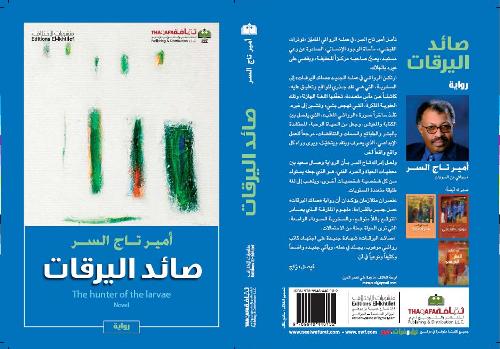The novel “The Grub Hunter” by Sudanese writer Amir Tag El-Sir is one of the most prominent literary works in the contemporary Arab scene. It gained wide popularity, was translated into several foreign languages, and was shortlisted for the International Prize for Arabic Fiction. The novel opens the door to profound philosophical questions about freedom, surveillance, and the boundaries between private and public life.
The story follows a former national security officer who retires and faces an overwhelming void in his life, prompting him to become a writer. The protagonist, Abdallah Harfash (nicknamed “Farfaar”), is an intelligence agent who loses his leg in an accident, forcing him into retirement. After leaving his job, he decides to write a novel that encapsulates his experience in the world of espionage. He begins frequenting a café frequented by intellectuals and writers — a place he once used to monitor — and starts living a different life. Abdallah soon becomes a subject of suspicion and surveillance by the security authorities, due to his visits to the café and his friendship with a well-known novelist. The story ends with a shocking twist, as Abdallah discovers that his novelist friend has turned him into the subject of his next book.
As the plot develops, the novel highlights the psychological and intellectual transformation of the protagonist, as he shifts from being a state surveillance officer to a man seeking to understand himself and the world around him. This transformation raises questions about the meaning of freedom, the limits of authority, and the relationship between the reader, the writer, and the literary text.
The novel is characterized by a poetic language and satirical style, in which Amir Tag El-Sir skillfully blends humor with philosophical reflection, giving the text depth and appeal that engage the reader beyond the storyline. The author also draws upon his medical background to provide detailed descriptions of his characters’ emotions, bodies, and behavior.
The novel received widespread critical acclaim, with many critics praising its exploration of the human psyche and its illumination of life within Arab societies. Some critics view “The Grub Hunter” as a literary journey from authority to freedom and from the observer to the writer — a trait that makes it as much a philosophical text as it is a narrative one.
تُعَدُّ رِوَايَةُ “صَائِدِ اليَرَقَاتِ” لِلْكَاتِبِ السُّودَانِيِّ أَمِير تَاج السِّرِّ وَاحِدَةً مِنْ أَبْرَزِ الأَعْمَالِ الأَدَبِيَّةِ فِي المَشْهَدِ العَرَبِيِّ المُعَاصِرِ، إِذْ حَقَّقَتْ شُهْرَةً وَاسِعَةً وَتُرْجِمَتْ إِلَى عِدَّةِ لُغَاتٍ أَجْنَبِيَّةٍ، كَمَا رُشِّحَتْ لِلْجَائِزَةِ العَالَمِيَّةِ لِلرِّوَايَةِ العَرَبِيَّةِ. تَفْتَحُ الرِّوَايَةُ البَابَ أَمَامَ أَسْئِلَةٍ فَلْسَفِيَّةٍ عَمِيقَةٍ حَوْلَ الحُرِّيَّةِ وَالمُرَاقَبَةِ، وَحُدُودِ التَّدَاخُلِ بَيْنَ الحَيَاةِ الخَاصَّةِ وَالعَامَّةِ.
تَتَنَاوَلُ الرِّوَايَةُ قِصَّةَ ضَابِطِ أَمْنٍ وَطَنِيٍّ سَابِقٍ يَتَقَاعَدُ مِنْ عَمَلِهِ وَيَجِدُ نَفْسَهُ أَمَامَ فَرَاغٍ هَائِلٍ فِي حَيَاتِهِ، فَيُقَرِّرُ أَنْ يُصْبِحَ كَاتِبًا. يتعرض بَطَلُ الرِّوَايَةِ وهُوَ عَبْدُ اللهِ حَرْفَش، المَعْرُوفُ بِـ”فَرْفَار”، لِحَادِثٍ يَفْقِدُ فِيهِ سَاقَهُ، مِمَّا يُضْطَرُّهُ لِلتَّقَاعُدِ، فيَجِدُ نَفْسَهُ خَارِجَ مَنْظُومَةِ عَمَلِهِ، وَيُقَرِّرُ كِتَابَةَ رِوَايَةٍ يَجْمَعُ فِيهَا عَصَارَةَ خِبْرَاتِهِ فِي مَجَالِ الاِسْتِخْبَارَاتِ. يَبْدَأُ عَبْدُ اللهِ بِالتَّرَدُّدِ عَلَى مَقْهًى يَرْتَادُهُ المُثَقَّفُونَ وَالأُدَبَاءُ، وَهُوَ مَكَانٌ كَانَ يُرَاقِبُهُ فِي السَّابِقِ، لِيَعِيشَ حَيَاةً مُخْتَلِفَةً. يُصْبِحُ عَبْدُ اللهِ شَخْصِيَّةً مَرْكَزِيَّةً لِلشُّكُوكِ وَالمُرَاقَبَةِ مِنَ السُّلُطَاتِ الأَمْنِيَّةِ، نَتِيجَةً لِتَرَدُّدِهِ عَلَى المَقْهَى وَمُصَاحَبَتِهِ لأَحَدِ الرُّوَائِيِّينَ المَعْرُوفِينَ. تَصِلُ الأَحْدَاثُ إِلَى نِهَايَةٍ صَادِمَةٍ، حَيْثُ يَتَلَقَّى عَبْدُ اللهِ صَدْمَةً فِي شَخْصِيَّةِ صَدِيقِهِ الرُّوَائِيِّ الَّذِي يَجْعَلُ مِنْهُ مَادَّةً لِرِوَايَتِهِ الجَدِيدَةِ.
تَتَطَوَّرُ أَحْدَاثُ الرِّوَايَةِ لِتُبْرِزَ التَّحَوُّلَ النَّفْسِيَّ وَالفِكْرِيَّ الَّذِي يَمُرُّ بِهِ البَطَلُ؛ إِذْ يَنْتَقِلُ مِنْ دَوْرِ المُرَاقِبِ المَسْؤُولِ إِلَى إِنْسَانٍ يَسْعَى لِفَهْمِ ذَاتِهِ وَالعَالَمِ المُحِيطِ بِهِ. هَذَا التَّحَوُّلُ يُثِيرُ تَسَاؤُلَاتٍ حَوْلَ مَفْهُومِ الحُرِّيَّةِ وَحُدُودِ السُّلْطَةِ، وَكَذَلِكَ عَنِ العَلَاقَةِ بَيْنَ القَارِئِ وَالكَاتِبِ وَالنَّصِّ الأَدَبِيِّ.
تَتَمَيَّزُ الرِّوَايَةُ بِلُغَةٍ شَاعِرِيَّةٍ وَأُسْلُوبٍ سَاخِرٍ يَجْمَعُ فِيهِ أَمِيرُ تَاج السِّرِّ بَيْنَ الفُكاهَةِ وَالتَّأَمُّلِ الفَلْسَفِيِّ، مِمَّا يَمْنَحُ النَّصَّ عُمْقًا وَجَاذِبِيَّةً لِلْقَارِئِ، وَيَدْفَعُهُ لِلتَّفْكِيرِ فِي مَفَاهِيمَ تَتَجَاوَزُ مُجَرَّدَ القِصَّةِ. كَمَا يَسْتَفِيدُ الكَاتِبُ مِنْ خِبْرَتِهِ الطِّبِّيَّةِ فِي تَقْدِيمِ وَصْفٍ دَقِيقٍ لِمَشَاعِرِ الشَّخْصِيَّاتِ وَتَفَاصِيلِ أَجْسَادِهَا وَتَصَرُّفَاتِهَا.
حَظِيَتِ الرِّوَايَةُ بِتَرْحِيبٍ نَقْدِيٍّ كَبِيرٍ، إِذْ أَشَادَ كَثِيرٌ مِنَ النُّقَّادِ بِطَرِيقَةِ اسْتِكْشَافِهَا لأَعْمَاقِ النَّفْسِ البَشَرِيَّةِ وَتَسْلِيطِهَا الضَّوْءَ عَلَى أَبْعَادِ الحَيَاةِ فِي المُجْتَمَعِ العَرَبِيِّ. وَيَرَى بَعْضُهُمْ أَنَّ “صَائِدَ اليَرَقَاتِ” تُجَسِّدُ تَحَوُّلًا مِنَ السُّلْطَةِ إِلَى الحُرِّيَّةِ، وَمِنَ المُرَاقِبِ إِلَى الكَاتِبِ، وَهِيَ سِمَةٌ تَجْعَلُهَا نَصًّا فَلْسَفِيًّا بِقَدْرِ مَا هُوَ سَرْدِيٌّ.
https://forms.gle/ncHkH25K2YgN5YTF9 اختبر نفسك
Test yourself https://forms.gle/YvZxFesRXSNHRtNg8

